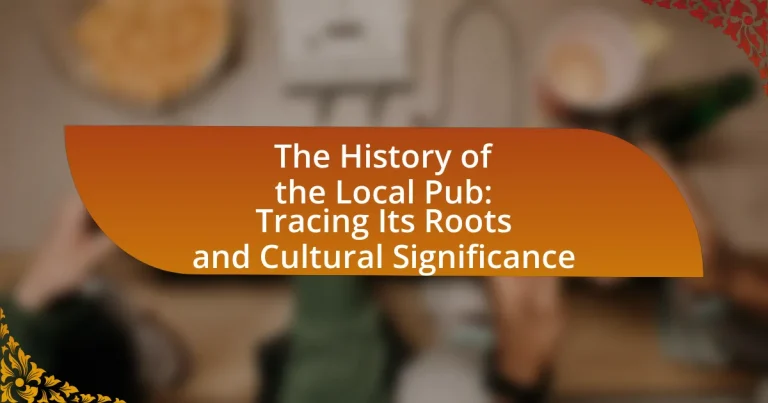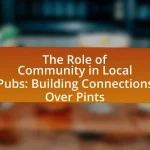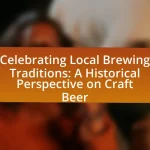The local pub, a significant social institution, has a history that traces back to ancient times, beginning in Roman Britain around the 1st century AD. Initially serving as inns for travelers, pubs evolved into vital community hubs during the Middle Ages and the Industrial Revolution, fostering social interaction and cultural identity. This article explores the origins, evolution, and cultural significance of local pubs, highlighting their role in community life, economic contributions, and the challenges they face today, including the impact of the COVID-19 pandemic and changing consumer behaviors. Additionally, it discusses strategies for supporting the sustainability of local pubs and their adaptation to modern societal norms.

What is the history of the local pub?
The local pub has a rich history that dates back to ancient times, serving as a social hub for communities. Originally, these establishments emerged in Roman Britain around the 1st century AD, where they provided food, drink, and lodging for travelers. Over the centuries, local pubs evolved, becoming integral to British culture, particularly during the Middle Ages when alehouses became popular among the working class. By the 19th century, the Industrial Revolution further transformed pubs into essential gathering places for laborers, often featuring games and entertainment. The significance of local pubs is underscored by their role in fostering community ties and social interaction, a tradition that continues today.
How did local pubs originate in different cultures?
Local pubs originated as communal gathering places across various cultures, often evolving from inns or taverns that provided food and drink to travelers. In ancient Rome, for instance, tabernae served as early forms of pubs, offering wine and a social space for locals. Similarly, in medieval England, alehouses emerged as centers for social interaction, where communities would gather to drink and share news. The significance of these establishments is underscored by their role in fostering social cohesion, as evidenced by historical records indicating that alehouses were often licensed by local authorities to ensure quality and safety. Thus, local pubs have consistently served as vital social hubs, reflecting the cultural practices and communal needs of their respective societies.
What were the earliest forms of public houses?
The earliest forms of public houses were taverns and inns, which emerged in ancient civilizations such as Greece and Rome. These establishments served as social gathering places where travelers could find food, drink, and lodging. Historical records indicate that in ancient Rome, for example, tabernae provided wine and simple meals, while in medieval Europe, inns became essential for accommodating pilgrims and merchants, often featuring communal dining areas and rooms for rent.
How did local pubs evolve over time?
Local pubs evolved from ancient communal gathering places to modern establishments that serve diverse functions. Initially, in ancient times, these venues were often associated with inns that provided food and shelter for travelers, as seen in Roman taverns. Over centuries, particularly during the Middle Ages, local pubs became integral to community life, serving as social hubs where people gathered for news, entertainment, and camaraderie. The introduction of beer brewing techniques in the 16th century further transformed pubs, leading to a rise in popularity and the establishment of licensed premises. By the 19th century, the Industrial Revolution catalyzed their evolution, as urbanization increased demand for local watering holes, resulting in the proliferation of pubs in cities. Today, local pubs continue to adapt, offering a range of services from dining to live entertainment, reflecting changing social dynamics and consumer preferences.
Why are local pubs significant in community life?
Local pubs are significant in community life because they serve as social hubs that foster connections among residents. These establishments provide a space for people to gather, share experiences, and build relationships, which enhances community cohesion. Historically, pubs have been integral to local culture, often hosting events, supporting local charities, and promoting local businesses. For example, a study by the Campaign for Real Ale (CAMRA) found that community pubs contribute to local economies by creating jobs and supporting local suppliers, reinforcing their role as vital community assets.
What role do local pubs play in social interactions?
Local pubs serve as vital social hubs that facilitate community interactions and foster relationships among individuals. They provide a relaxed environment where people gather to share experiences, engage in conversations, and build connections. Research indicates that local pubs contribute to social cohesion by offering a space for diverse groups to interact, thereby enhancing community ties. For instance, a study published in the Journal of Community Psychology found that regular visits to local pubs can lead to increased social networks and a sense of belonging among patrons. This underscores the significant role local pubs play in promoting social interactions and strengthening community bonds.
How do local pubs contribute to local economies?
Local pubs contribute to local economies by generating revenue through sales, creating jobs, and fostering community engagement. They serve as social hubs, attracting both locals and tourists, which stimulates spending in surrounding businesses. According to a report by the British Beer and Pub Association, pubs contribute approximately £23 billion to the UK economy annually and support over 900,000 jobs. This economic impact is further enhanced by local sourcing of food and beverages, which keeps money circulating within the community.
What are the key historical milestones in the development of local pubs?
The key historical milestones in the development of local pubs include the establishment of Roman taverns in Britain around 43 AD, which served as early social gathering places. In the Middle Ages, the rise of alehouses occurred, providing a space for communities to gather and drink locally brewed beer. The Licensing Act of 1730 regulated the number of pubs and their operations, leading to the proliferation of licensed establishments. The Industrial Revolution in the 19th century further transformed pubs into essential social hubs for workers, often featuring entertainment and food. The introduction of the Beerhouse Act in 1830 allowed for the easier establishment of beerhouses, increasing accessibility. By the late 20th century, the pub culture evolved with the emergence of gastropubs, blending dining and drinking experiences, reflecting changing consumer preferences. Each of these milestones illustrates the evolving role of pubs in British society, from simple taverns to complex social institutions.
What changes occurred during the Industrial Revolution?
The Industrial Revolution brought significant changes, including the transition from agrarian economies to industrialized ones, marked by the rise of factories and mass production. This shift led to urbanization, as people moved to cities for work, resulting in population growth in urban areas. Additionally, technological advancements such as the steam engine and mechanized textile production transformed industries, increasing efficiency and output. The introduction of railways revolutionized transportation, facilitating trade and the movement of goods. These changes collectively altered social structures, labor practices, and economic systems, laying the groundwork for modern society.
How did legislation impact the operation of local pubs?
Legislation significantly impacted the operation of local pubs by regulating their hours of operation, licensing requirements, and alcohol sales. For instance, the Licensing Act of 1830 in the UK allowed for the establishment of beerhouses, which increased the number of pubs and made alcohol more accessible to the public. Additionally, the introduction of the Licensing Act of 2003 modernized the licensing system, permitting longer opening hours and allowing pubs to operate more flexibly, which contributed to their economic viability. These legislative changes have shaped the social and economic landscape of local pubs, influencing their role in community life.

How do local pubs reflect cultural identities?
Local pubs reflect cultural identities by serving as communal spaces that embody the traditions, values, and social practices of their communities. These establishments often showcase regional beverages, local cuisine, and decor that highlight historical and cultural narratives specific to the area. For instance, in the UK, many pubs feature local ales and traditional dishes, reinforcing a sense of place and belonging among patrons. Additionally, local pubs frequently host events that celebrate cultural festivals or community gatherings, further solidifying their role as cultural hubs. This connection is supported by studies indicating that pubs contribute to social cohesion and community identity, as they provide a venue for shared experiences and interactions among diverse groups.
What cultural practices are associated with local pubs?
Cultural practices associated with local pubs include socializing, community gatherings, and traditional events such as quiz nights and live music performances. These establishments serve as communal spaces where individuals engage in conversation, celebrate local culture, and foster relationships. Historically, pubs have been central to community life, often hosting events that reflect local traditions, such as St. Patrick’s Day celebrations in Ireland or beer festivals in Germany. The significance of these practices is underscored by studies indicating that pubs contribute to social cohesion and community identity, making them vital to the cultural fabric of many societies.
How do local pubs celebrate regional traditions?
Local pubs celebrate regional traditions by hosting events that reflect local customs, festivals, and culinary practices. For instance, many pubs organize themed nights that coincide with regional holidays, such as St. Patrick’s Day in Ireland, where they feature traditional music, food, and drinks specific to the celebration. Additionally, local breweries often collaborate with pubs to create special brews that honor local ingredients or historical brewing methods, reinforcing the connection to the region’s heritage. This practice not only fosters community engagement but also preserves and promotes local culture, as evidenced by the rise of “pub quizzes” that incorporate local history and trivia, further embedding regional identity into the pub experience.
What types of events are commonly held in local pubs?
Local pubs commonly host events such as trivia nights, live music performances, karaoke, and pub quizzes. These events foster community engagement and social interaction, making pubs central to local culture. For instance, trivia nights often attract teams competing for prizes, while live music can feature local bands, enhancing the pub’s role as a cultural hub. According to a survey by the British Beer and Pub Association, 70% of pubs in the UK regularly hold events to attract patrons and create a vibrant atmosphere.
Why are local pubs considered a hub for community engagement?
Local pubs are considered a hub for community engagement because they serve as social gathering places that foster connections among residents. These establishments often host events, such as trivia nights and live music, which encourage interaction and participation from the community. Historically, pubs have been integral to local culture, providing a space for people to share news, celebrate milestones, and build relationships. Research indicates that communities with active local pubs experience higher levels of social cohesion and civic participation, reinforcing their role as vital centers for community life.
How do local pubs foster a sense of belonging?
Local pubs foster a sense of belonging by serving as communal spaces where individuals can gather, socialize, and build relationships. These establishments often host events, such as trivia nights and live music, which encourage interaction among patrons and create a shared experience. Research indicates that regular visits to local pubs can enhance social networks and community ties, as they provide a consistent environment for people to connect. Additionally, the informal atmosphere of pubs allows for open conversations and the formation of friendships, reinforcing a sense of community identity.
What initiatives do local pubs undertake to support their communities?
Local pubs undertake various initiatives to support their communities, including hosting charity events, providing a venue for local artists, and sourcing food and beverages from local suppliers. These actions foster community engagement and economic support. For instance, many pubs organize quiz nights or fundraisers that directly benefit local charities, helping to raise thousands of dollars annually for community causes. Additionally, by showcasing local musicians and artists, pubs contribute to the cultural vibrancy of the area, while sourcing locally helps stimulate the local economy and reduce environmental impact.
How do local pubs adapt to changing societal norms?
Local pubs adapt to changing societal norms by diversifying their offerings and creating inclusive environments. For instance, many pubs now provide a wider range of non-alcoholic beverages and food options to cater to health-conscious consumers and those who abstain from alcohol. Additionally, pubs are increasingly hosting events that promote inclusivity, such as LGBTQ+ nights and family-friendly activities, reflecting a broader acceptance of diverse social groups. According to a 2021 survey by the British Beer and Pub Association, 60% of pubs reported changing their menus to include healthier options, demonstrating their responsiveness to evolving consumer preferences.
What trends are currently shaping the future of local pubs?
Current trends shaping the future of local pubs include a focus on community engagement, diversification of offerings, and the integration of technology. Community engagement is evident as pubs increasingly host events, support local charities, and create spaces for social interaction, fostering a sense of belonging. Diversification of offerings is seen in the expansion of food menus, craft beers, and non-alcoholic options, catering to a broader audience and changing consumer preferences. The integration of technology, such as mobile ordering and contactless payments, enhances customer convenience and operational efficiency. These trends reflect the evolving role of local pubs as vital social hubs in their communities.
How are local pubs responding to the rise of craft beverages?
Local pubs are increasingly adapting to the rise of craft beverages by expanding their drink offerings to include a diverse selection of local and artisanal beers, wines, and spirits. This shift is evident as many pubs now feature rotating taps dedicated to craft brews, often sourced from nearby breweries, which enhances their appeal to a growing demographic of craft beverage enthusiasts. According to the Brewers Association, the craft beer market has seen consistent growth, with craft breweries accounting for over 23% of the U.S. beer market share in 2022, prompting local pubs to align their menus with consumer preferences for unique and high-quality beverages.

What challenges do local pubs face today?
Local pubs today face significant challenges including declining patronage, increased competition from alternative drinking establishments, and rising operational costs. The decline in patronage is often attributed to changing social habits, with younger generations favoring home drinking or bars that offer unique experiences. Increased competition arises from craft breweries and cocktail bars that attract customers with innovative offerings. Additionally, rising costs related to rent, labor, and regulatory compliance further strain the financial viability of local pubs. According to a report by the British Beer and Pub Association, the number of pubs in the UK has decreased by over 10,000 since 2000, highlighting the severity of these challenges.
How has the COVID-19 pandemic affected local pubs?
The COVID-19 pandemic has significantly impacted local pubs by forcing many to close temporarily or permanently due to government restrictions and reduced patronage. According to a report by the British Beer and Pub Association, approximately 15,000 pubs in the UK closed permanently during the pandemic, representing a loss of around 20% of the total number of pubs. Additionally, those that reopened faced capacity limits, social distancing measures, and increased operational costs, which further strained their financial viability. The pandemic also accelerated the shift towards takeout and delivery services, altering traditional pub operations and customer interactions.
What measures have local pubs taken to ensure safety?
Local pubs have implemented various safety measures to protect patrons and staff, including enhanced sanitation protocols, social distancing guidelines, and capacity limits. These measures have been adopted in response to health guidelines, particularly during the COVID-19 pandemic, where pubs increased cleaning frequency, provided hand sanitizers, and reconfigured seating arrangements to maintain safe distances between customers. Additionally, many pubs have adopted contactless payment systems to minimize physical contact, further ensuring a safer environment for all.
How have customer behaviors changed post-pandemic?
Customer behaviors have shifted significantly post-pandemic, with a marked increase in preference for online ordering and delivery services. According to a report by McKinsey, 75% of consumers have tried new shopping behaviors during the pandemic, and many intend to continue these habits, particularly in the food and beverage sector. Additionally, there is a growing emphasis on health and safety, leading customers to favor establishments that prioritize hygiene and social distancing measures. This shift reflects a broader trend towards convenience and safety in consumer choices, reshaping the dynamics of local pubs and their service offerings.
What economic pressures are local pubs currently experiencing?
Local pubs are currently experiencing significant economic pressures primarily due to rising operational costs, decreased foot traffic, and competition from alternative drinking venues. The cost of goods, including alcohol and food, has increased due to inflation, impacting profit margins. Additionally, many pubs have seen a decline in patronage as consumer behavior shifts towards home drinking and online delivery services. According to a report by the British Beer and Pub Association, the sector faced a 30% drop in sales during the pandemic, and recovery has been slow, with many establishments struggling to return to pre-pandemic levels. These factors collectively create a challenging environment for local pubs, threatening their sustainability and cultural significance within communities.
How do rising costs impact the operation of local pubs?
Rising costs significantly impact the operation of local pubs by increasing overhead expenses, which can lead to reduced profit margins. For instance, the price of ingredients, utilities, and labor has risen, forcing many pubs to either increase prices for customers or cut back on staff and services. According to a report by the British Beer and Pub Association, the cost of beer production has increased by 20% over the past two years, directly affecting pricing strategies and customer footfall. Consequently, local pubs may struggle to maintain their traditional role as community hubs, as higher prices can deter patrons and reduce overall patronage.
What strategies are local pubs using to remain competitive?
Local pubs are employing various strategies to remain competitive, including diversifying their offerings, enhancing customer experience, and leveraging technology. By introducing unique food and drink menus, such as craft beers and locally sourced dishes, pubs attract a broader clientele. Additionally, creating inviting atmospheres through live music, themed events, and community engagement fosters loyalty among patrons. The adoption of digital tools, such as online reservations and social media marketing, allows pubs to reach new customers and streamline operations. These strategies are essential for maintaining relevance in a rapidly changing hospitality landscape.
What can be done to support the sustainability of local pubs?
To support the sustainability of local pubs, communities can actively promote and patronize these establishments. Increased local patronage directly contributes to their financial viability, as evidenced by a study from the Campaign for Real Ale (CAMRA), which found that pubs that engage with their communities see a 20% increase in customer loyalty. Additionally, local governments can implement policies that reduce business rates for pubs, thereby lowering operational costs and encouraging longevity. Supporting local breweries and sourcing ingredients from nearby farms can also enhance the pub’s appeal and sustainability, as this practice fosters local economic growth and reduces carbon footprints associated with transportation.
How can communities rally to support their local pubs?
Communities can rally to support their local pubs by organizing events, promoting pub activities, and encouraging patronage. For instance, hosting community gatherings, quiz nights, or live music events can draw in locals and create a vibrant atmosphere. Additionally, local businesses can collaborate with pubs for cross-promotions, enhancing visibility and customer traffic. Research indicates that community engagement in local establishments fosters economic resilience; a study by the Institute for Local Self-Reliance found that locally owned businesses recirculate a greater share of every dollar as they create locally based supply chains. This demonstrates that active community involvement not only supports pubs but also strengthens the local economy.
What best practices can local pubs adopt for long-term success?
Local pubs can adopt several best practices for long-term success, including community engagement, quality service, and diverse offerings. Engaging with the community through events, sponsorships, and partnerships fosters loyalty and attracts a steady customer base. Providing quality service ensures a positive customer experience, which is crucial for repeat business; studies show that 70% of customers return due to good service. Additionally, offering a diverse menu that includes local craft beers, seasonal dishes, and accommodating dietary preferences can attract a wider audience, as 60% of consumers prefer establishments that cater to various dietary needs. Implementing these practices can significantly enhance a pub’s sustainability and relevance in the local market.


